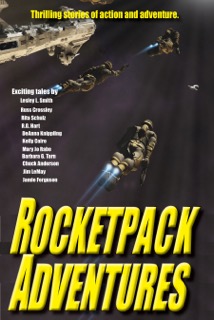
Next time: a report from the Electric Spec Production Meeting.
 |
Rocketpack Adventures Anthology available October 29, 2018! |
Check it out!
One major issue is you must connect with the reader on an emotional level. To scare the reader, you have to make the reader care about the characters. Thus, usually, the opening of such a story should make the reader empathize with the point-of-view character. (In a flash piece this can be very difficult.) I think this is especially important in horror fiction if you want to scare the reader, make them uneasy. In such cases, first, you have to make them easy. :)
Another issue is there is a long, rich history of horror fiction in our culture. Please be aware of it. If an author expects a surprise reveal that the protagonist is actually a vampire/ghoul/ghost/werewolf/axe-murderer to work, think again.
All that being said, we enjoy macabre fiction. Show us something fresh!
Early Happy Halloween!
The editors are working their way through slush. Some do a pretty good job keeping up with it, some tend to procrastinate. If you submitted, you should hear back in the next two weeks for an initial thumbs up or down.
I've been reading a lot of slush. Some authors authors do a great job of telling their story through the lens of character. Some do not. Most modern story-telling is told via a very close point-of-view, be it third person or first person. In this case, everything in the story needs to be told through the subjective lens of your pov character. This includes language, metaphors, similes. This includes vocabulary and dialogue. This includes descriptions of other people, places and things.
If an author doesn't carefully implement this, the author's subjective lens is the default. This can work, if it's consistent. A haphazard mish-mash of pov, however, does not work.
When the lens of character is successfully implemented, the story is a joy to read...
Send us your stories!
I read a story recently that had extended 'Hello' and 'Goodbye' scenes. These scenes seemed very realistic in terms of dialogue. Unfortunately.
I challenge anyone reading this to go to a crowded spot and listen to people talking. You'll hear a lot of Hey's, Um's, So's, and similar words. Talking in the real world is a way to communicate and emotionally connect with other people but, generally, it's not efficient. Sometimes the actual words don't even matter because just showing up matters, participating matters, nonverbal communication matters.
Dialogue in story world should not be realistic. It should be fictionalized. Dialogue in a story should convey plot information, help build the fictional world, and it should characterize the speaker. It should be efficient. Words in story world do matter, because the words on the page are the only way we can communicate and connect with the reader. Every word is important.
The submission deadline for the November issue is fast approaching: October 15, 2018.
Send us your stories laden with unrealistic dialogue! :)